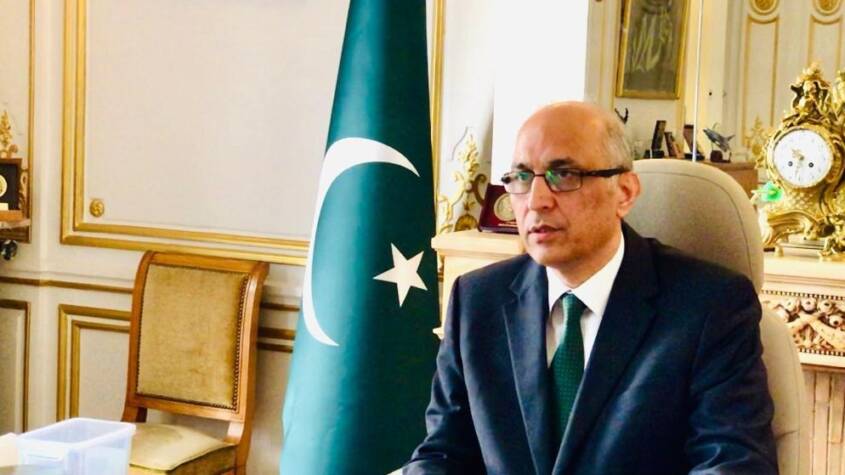BEIJING, 25th Feb, 2021: Pakistan’s Ambassador to China Moin ul Haque on Thursday said that Pak economy is showing signs of improvement in the sector of Information Technology (IT), banking and telecoms industry.
Addressing a webinar on Post-COVID Global Investment Climate and Opportunities for Pakistan, he appreciated China’s efforts and achievements in the global response to the epidemic, and thanked China for its support and assistance to Pakistan in the fight against the epidemic.
Timely measures taken by the Pakistani government including providing construction incentives, 10 Billion Tree Tsunami, etc have played a crucial role in combating COVID-19.
He affirmed the positive significance of China-Pakistan Economic Corridor (CPEC) that even during the pandemic there was no undue delay on the project.
Khyber Pakhtunkhaw is an important part of CPEC, and bilateral trade between Pakistan and China remains vigorous. Mineral, leather sporting goods, agricultural products, etc are all emerging sectors, he added.
Ambassador Haque also believes in the bright future of developing tourism in Khyber Pakhtunkhaw.
According to China Economic Net (CEN), Kiyoshi Taniguchi, Principal Economist, Asian Development Bank, stated that Pakistan’s structural challenges include economic mismanagement, lack of resilience to external shocks and lack of competitiveness. Although high cost of finance is a concern, access to credit to the private sector, especially to SMEs, is a more critical binding constraint.
Investments in Pakistan have been historically low compared to other countries. Increasing FDI will require addressing the impediments including poor risk assessment, weak political stability, inconsistent policies and difficult business environment, he said.
Sulaiman S. Mehdi, Chairman of Pakistan Stock Exchange (PSX) said that during the second wave of pandemic in Pakistan, the Government initiated smart lockdown measures and maintained an open mode of industrial production, which was clearly sensible.
In a sense, Pakistan is the beneficiary of the second wave of the epidemic as social expenditure has been converted into savings and entered Pakistan in the form of remittances. Besides, as industries in countries such as Bangladesh and India were completely blocked, export orders shifted to Pakistan, particularly in the textile industry. Very little motivation for traveling abroad which also helped preserve the foreign exchange reserves as well, he emphasized.
Growth in KP indicated more finance support from federal government, urban agglomeration, regional trade remittances from abroad, Sulaiman S. Mehdi further said.
KP can attract investments in industry, construction, agriculture, livestock, mining and tourism, and all these investments can be managed through friendly private sector policies, he said.
Charles Schneider, Senior Sector Specialist IFC, WBG shared his opinion in the context of a definitely improving security environment of KP. KP Province needs targeted investment methods, focusing on where the country and the province have comparable investment experience so far. Pakistan can learn from foreign direct investment projects. Project management methods are necessary to deal with strategic investors.
Amjad Pervez, Chairman Jump Start Pakistan, stressed the important role of overseas Pakistanis in helping to sustain the challenges currently facing Pakistan.
It’s pertinent to encourage the confidence of overseas Pakistanis to invest and create the prosperity and abundance of the country. Pakistani companies need access to reach global markets which can help SMEs to obtain financing. He underlined the necessity to develop entrepreneurial human capital in Pakistan as well.
Participants, while being optimistic, deliberated and brainstormed ideas aimed at speedy economic recovery of Pakistan in the post-pandemic area. They also highlighted the challenges that Pakistan needed to address for a sustained economic growth.
















